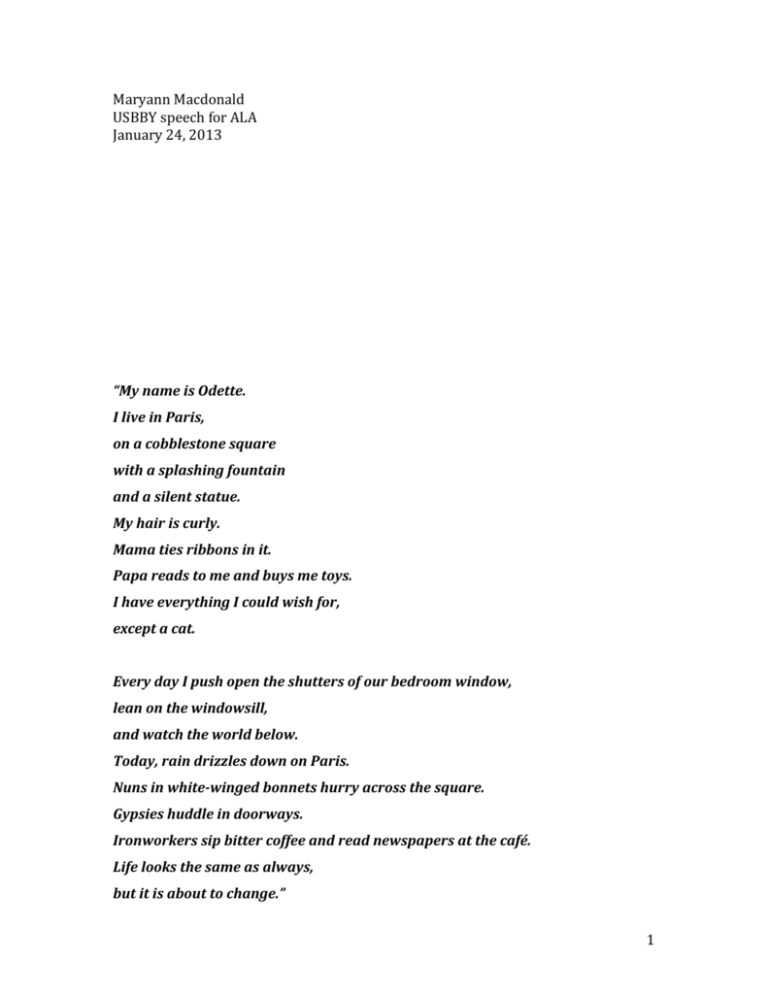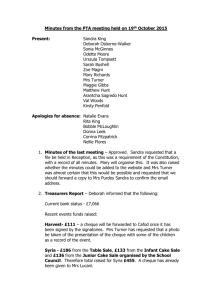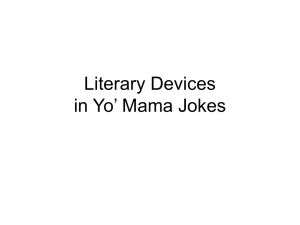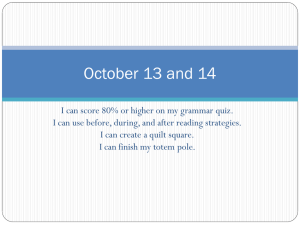Mama says. - Texas Bluebonnet Award 2014-2015
advertisement

Maryann Macdonald USBBY speech for ALA January 24, 2013 “My name is Odette. I live in Paris, on a cobblestone square with a splashing fountain and a silent statue. My hair is curly. Mama ties ribbons in it. Papa reads to me and buys me toys. I have everything I could wish for, except a cat. Every day I push open the shutters of our bedroom window, lean on the windowsill, and watch the world below. Today, rain drizzles down on Paris. Nuns in white-winged bonnets hurry across the square. Gypsies huddle in doorways. Ironworkers sip bitter coffee and read newspapers at the café. Life looks the same as always, but it is about to change.” 1 These are the first lines of my book, Odette’s Secrets. It is the story of one small girl, caught in the middle of a gigantic war, and how that war changed things for her forever. One late August afternoon a few years ago, I was walking through an old Jewish neighborhood in Paris. When I passed an elementary school, I noticed a bronze plaque. The plaque honored the memory of the Jewish children, students at the school, who had been deported from France during World War II. I put my hand on the warm stone of that school, trying to more deeply access the reality of that event. School children! Deported! Who were they? What were their lives like in France during that dangerous time? I began to read about life in Paris during World War II, especially about the life of French Jewish children. Eleven thousand four hundred of them were deported, I learned. Most died in concentration camps in Eastern Europe. But despite the fact that most people think of the French as Nazi collaborators, more children survived in France than in any other occupied European country, eighty-four percent. How did this happen? The majority were hidden in homes, convents and monasteries and at farms and schools all over the country. To stay successfully hidden, children had to reinvent themselves, to deny their families and their identity and “become” French Christians. How and at what cost were these children able to do this? In October I was still thinking over these questions when I was invited to the American Library in Paris to read my book, The Costume Copycat, at the library’s annual Halloween party. After all the pirates and princesses had gone home, I went upstairs to browse in the stacks. And there, by chance, I found Doors to Madame Marie, the memoir of Odette Meyers, a woman who had been one of those hidden French children during the war. 2 I became fascinated by Odette’s story. It seemed to me it was the story of one child who represented many. I pored over the photographs of her and her family and friends, read and reread her adventures, especially the passages where she described what it was like to switch selves, not once but twice, both in the remote countryside of the Vendee where she hid and then back in Paris again after the war. I visited the street where Odette’s family lived, and sat in the square opposite their building, studying the door and the window of their apartment above. I walked up the street, as Odette did, imagining her holding the hand of her beloved Monsieur Henri, as he led her past the French policemen sent to arrest her and her mother on Black Thursday, July 16, 1942. Did the café and the convent look the same then? Where was her school? I explored the alleyway where her dear cousins lived, the cousins who were deported and killed. I strolled in the park where Odette played, and visited Pere La Chaise, the cemetery where she literally came face-toface with who she was after the war. One night, I told my husband George Odette’s story. Together, we took the Metro to the 11th arrondissement and stood outside Odette’s apartment building. “I so wish I could go inside!” I said, looking at the heavy oak front door. “Let’s see if we can,” George said, and pressed his fingertips against the door. It swung open! In moments we were standing in the tiled hallway where Odette played with her red rubber ball. At the end was the tiny apartment of her godmother, Madame Marie, the place where Odette and her mother hid in her broom closet when the police came at dawn to arrest them. I couldn’t believe my luck…the easy opening of that heavy door seemed like a sign. It was the first in a series of events connected to the writing of this book that seemed extraordinarily fortuitous. Now I just had to write the story of Odette’s remarkable life. I had grown up in an immigrant neighborhood near Detroit just after the war. World War II stories, including some involving the holocaust, were part of the fabric of our everyday lives. But I had never before heard the story of how children saved themselves from 3 death through their own courage, ingenuity and resilience. This was the story I wanted to tell. But how could I do this? Odette had lived and prospered as a mother, a teacher and a writer, but she had died in 2002. Still, I knew she had a son, and I found his number in the Paris telephone directory. With my heart in my mouth, I dialed that number. I left a message, explaining who I was and what I hoped to do. Then I waited. A few days later, Daniel telephoned me and invited me to lunch in his sunny apartment on the rue Rambuteau. He listened to my request and made his decision almost immediately. His mother, he said, had often talked in schools and libraries to children about her wartime experiences. He was sure she would want her story to live on. As her literary executor, he gave me the permission I needed, opening another door. I was thrilled, but wanted to learn as much as I could about Odette and her family first. After all, this was their story, and I wanted to tell it as truthfully as possible. Daniel gave me his grandmother’s autobiography (originally written in Yiddish) and some of his mother’s poems to read. He showed me filmed interviews with his mother and grandparents, interviews that had been made for Steven Spielberg’s holocaust survivors’ archive. We also watched the award-winning 1984 film, The Courage to Care, in which Odette took part. Daniel explained that although Odette and her three friends thought they were the only Jewish children in the small village they lived in the remote country area of the Vendee, in fact, more than forty children were hidden there. I decided I needed to visit the Vendee. I took the train Odette took to Nantes. All the way I studied the farmhouses, the villages and the train stations passing by. What was there in 1942? Did Odette see it as I did? Then I drove to the first village where Odette was hidden in plain sight during the war. My husband and I were standing across the street from the house she lived in when the shutters of an upstairs window swung open. An old man stood above us. “Can I help you?” he asked. I shook my head. We didn’t mean to intrude, I explained, but we had heard the story of what had happened in this house during WWII. “Je viens,” he responded, and yet another door opened. 4 The old man was Jacques Raffin, one of the children in the family who had taken Odette in. He invited us into his home and showed us the garden where the children had played on the swing and fed the pigeons. We talked in the kitchen where Odette had eaten her soup. Afterwards, we visited the school Odette attended with her friends Cecile and Paulette, and the church where she went to Mass every Sunday. Finally, we went to the hamlet where Odette and Mama lived together under assumed names. We saw the forest and the square where she played hide and seek and hopscotch, the pathway she took walking to school. Now that I had walked in Odette’s footsteps as far as I could, I had to write. At first I tried to tell Odette’s story as biography. I wanted everything in it to be as true and real as possible. But this version seemed too dry. I thought and thought about what to do. I knew Odette had loved poetry, and even thought, as her father had, that the beauty she found in reading it had helped her to survive her wartime experiences. I also knew that when she grew up, she became a professor of literature, wrote poetry of her own, and married a poet. So I decided that when I sat down to write the book again, I would channel Odette’s childhood voice, the voice of the poet she would be. This change from prose to free verse changed the book from nonfiction to fiction and let the story live. My hope was that the intimacy it created, the sense that the child Odette was telling her story to readers herself, would help bridge the gap in time that existed between her long-ago and far-away world and our own. I wanted to capture the rhythms of her voice and life. Near the beginning of Odette’s story is a passage called “Cracked Glass.” “Sunday comes. Mama and I go to the public baths. We rent a room with a tub and a shower for fifteen minutes. 5 I play mermaid in the tub. Mama scrubs in the shower. Then I rinse off while Mama soaks. When we’re done, we rub our clean bodies all over with scratchy white towels. Mama kisses my nose. Then she splashes cologne all over us. Smelling like violets, we walk home together, swinging hands. On our way, we pass a furniture store. Its windows are broken. We stand on slivers of cracked glass to peer inside. Someone has smashed a mirror and slashed a sofa. “Who did this?” I ask Mama. “People who hate Jews,” Mama says. “The owner of the store is Jewish.” 6 This makes no sense to me. Are Jews different from other people? I wonder. How? I look up at Mama and wait for her to explain, but she just shakes her head. ” Soon, Poland is invaded and the world bursts into flame. Still, Odette is a child, so on the day of the invasion, she is happy because Mama has taken her out of school early. “The pigeons pick and peck in the dappled light around the splashing fountain. I scatter crumbs for them. Then I pass by the gypsies who are always there and look at the statue of a man. He leans forward on his knee, his chin propped up on his hand. 7 Papa once told me he’s called The Thinker. What are his thoughts? Is he worried about war and Poland? Or does he wonder what I wonder . . . why doesn’t he have any clothes on?” When the Nazis come, Odette again sees the Occupation through the eyes of a hungry child. “We dream of eggs, milk, and butter, but most of all real bread . . . the kind we eat now tastes like sawdust. Some people say it is made of sawdust! “French bread,” says Mama, with a groan. “Only the name is the same as before!” “Mama?” I say. I know I shouldn’t interrupt, but I’m hungry. 8 “What now, Odette?” she asks. “Can’t you be quiet for even one minute?” Then she looks at my face and she’s sorry. She gives my cousin and me each a cookie. After that, she and Aunt Georgette talk in their old language, Yiddish. Sophie and I can’t understand the words, but we understand fear. It’s still there, in their voices.” Even in the most dangerous times, family fun and silly jokes are important to children everywhere. In this passage, Odette describes a visit to her cousins’ small apartment. “A long table fills the center of the room, with chairs around it and beds on the side. 9 At least one lamp glows there all the time. Aunt Miriam’s sweet-smelling onion soup simmers on the stove. Maurice lifts me up to see their calendar. It has a joke printed on it for every day of the year. “The waiter puts coffee on the man’s table,” Maurice reads. ‘It looks like rain,’ he says to his customer. ‘Tastes like it too,’ says the man.” Everyone laughs. Fake wartime coffee is terrible. My younger cousins beg to see tomorrow’s joke. “No,” says Maurice. “Let’s save it.” So Uncle Motl shares a joke with us. “Did you know Hitler’s dog has no nose?” he asks. “How does he smell?” I ask. “Terrible,” Uncle Motl replies.” 10 A kind librarian saves the day later that summer. Odette and her cousins Sarah and Henriette are out for a walk. The girls wander aimlessly since Jews are not allowed to go to public parks or swimming pools, or even to make a fuss. When they are denied even a drink of water at the café, three-year-old Henriette begins to cry, loudly…until the girls spot a basement library. “Clutching the handrail, chubby little Henriette walks down to the library, all by herself. Sarah and I wait a few minutes, then go down the steps into the library too. The librarian spots our yellow stars. She drops the book she’s showing to Henriette. Sarah picks it up and hands it to her. “Are you her mother?” the librarian asks Sarah. My cousin’s big for thirteen. “No,” says Sarah, “I’m her sister. 11 Henriette gazes up like an innocent angel. “Sarah, will you read to me?” she asks. “Please?” The librarian’s eyes dart around quickly. No one has seen us, or our yellow stars. “All right,” she says. She flutters her hands toward the picture-book corner. ‘Take the children over there and stay there. I’ll be at my desk.’ Open books cover our stars like shields. Henriette forgets she is thirsty. The librarian, our gatekeeper, pretends we are children like any others. All afternoon, we read fairy tales. In our cave of bookshelves, 12 we feel safe from the evil giants marching down the street.” One of the best things a library can do is give a feeling of peace and safety. Another is to give people a window on the wider world. When I was a child, my father took all of his eight children on bi-weekly trips to our excellent local library. Although our family never travelled, the world opened up to us at that library. I fell in love with Mary Poppins, Bedknobs and Broomsticks and The Secret Garden. Nourished and encouraged by these British books, I learned not only to love reading but to love writing, as well. When I grew up I went to England, where I lived for 24 years. The Mason branch of the Dearborn Public Library, with its inspiring murals and elegant fireplaces, was my springboard to the larger world. All the books I will ever write began in that library. Readers at your library, too, may write books one day because you are their librarian. Thank you for what you do every day for readers and writers. 13









